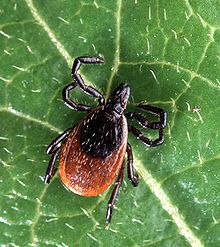Protecting Against Ticks (and Lyme disease) in Wales, Wisconsin & Northern Illinois
 Of all the creepy-crawlies out there, ticks are among the most repellent.
Of all the creepy-crawlies out there, ticks are among the most repellent.
They latch onto a host. Creep around. Dig in. Gorge on blood. Yuck.
Worse, tick numbers are increasing in Wales, Wisconsin and northern Illinois. Mild winters and a healthy deer herd (which carries ticks) are often blamed.
Ticks Can Spread Lyme Disease
Ticks are vile creatures. They can be dangerous, too. The pinhead-size deer tick (one of two tick species in this area) can carry Lyme disease. Its symptoms include a ring-shaped rash and fatigue; long-term effects can extend to harming organs and the nervous system. Permanent disability is a very real possibility.
The Centers for Disease Control and Prevention estimate that 300,000 Americans contract Lyme disease annually. Don’t be one in Wales. If you have ticks in your yard or are anxious about the possibility, contact The Mosquito Guy
A single tick protection application by The Mosquito Guy will control ticks on your property for up to 30 days. Late spring and early summer are peak tick season, so applying tick repellent by mid-May is endorsed. Treatment starts at just $125 per yard.
Two treatments usually deliver sufficient tick control. If you want to prevent ticks in your yard, call 262-521-1258, or e-mail margie@themosquitoguy.com, for a free quote.
You can take safety measures on your own, too. Ticks can’t jump or skitter, so try creating separate paths between lawn and wooded areas using wood chips or gravel. Clearing away tall grass helps.
When you’re outside, wear long-sleeved shirts and long pants to shield against ticks. Tucking pants into socks or boots creates a tight barrier. Wearing light-colored clothing makes ticks less able to hide.
Powerful tick repellents are available. Twenty percent DEET formula is advised.
Once back inside, check your entire body for ticks. They like to hide, so don’t overlook your body’s natural areas of cover: hair, scalp, armpits, groin and behind the knee. Even wood ticks, the other common species in Wales, are only about a quarter-inch long (before blood siphoning, that is). Don’t be shy about searching, lest you miss a hitchhiker.
If you find one, here’s how to remove it: Grab with a tweezer as close to the skin as possible, and pull straight up and out.
Don’t forget to check pets, too. If your dog or cat roams tick habitat, a vet can apply or recommend a topical repellent to keep ticks away.
The ideal approach, of course, is to make your yard as unwelcoming to ticks as possible … and that’s where The Mosquito Guy can help. Contact us for a yard application to keep ticks away. Consider it an investment against “disgusting” … and into your peace of mind.


